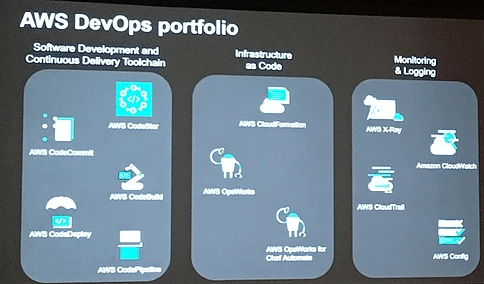We attended the recent AWS Summit at the Javits Centre in NYC on the 14th August. This was a big one, with 20,000 registrants and an estimated turnout of 15,000 making for a great atmosphere. The fact that AWS re:Invent held each year in Las Vegas is far larger is mind-blowing.

The main aim of our visit was to learn more about new AWS and partner offerings, as well as have the opportunity to connect and network with like-minded individuals who see the many benefits of cloud adoption in all its various colours and flavours.
The main centre of activity was The HUB, a Partner and Solutions Expo, with many well-known businesses dying to see who could offer the most appealing swag. The queue at DataDog arguably placed them as the clear winner. Following a keynote that included interesting new product announcements from Adrian Cockcroft (VP Cloud Architecture Strategy, AWS) and Dr. Matt Wood (GM AI, AWS) it was straight into the meat and potatoes of the event…..the technical breakout sessions.

Apache MXNet
Of particular interest was the session on deep learning and Apache MXNet.
“Apache MXNet (MXNet) is an open source deep learning framework that allows you to define, train, and deploy deep neural networks on a wide array of platforms, from cloud infrastructure to mobile devices. It is highly scalable, which allows for fast model training, and it supports a flexible programming model and multiple languages.”
Interestingly, AWS predict that in the next few years about 50% of all deep learning will be performed in the cloud. Training algorithms will run in the cloud, and edge devices (such as smartphones and driverless cars) will run the small and lightweight output from this training process. MXNet competes with other AI engines such as Google’s TensorFlow and Microsoft’s Cognitive Toolkit. AWS are supporting MXNet because it is open source, supports more languages, has a smaller source-lines-of-code (SLOC) size, and a smaller memory footprint.
DevOps
Another useful session at the AWS Summit showcased their DevOps capabilities. Their service offerings continue to be industry leading, showing breadth and depth in the three main tooling areas, namely Software Development and Continuous Delivery, Infrastructure as Code, and Monitoring and Logging.

However, as anyone who has attempted shifting to DevOps well knows, having the right tools is only part of the puzzle. Equally important is practice (process) or how you go about using the tools. Arguably the most important factor to DevOps success, however, is Culture or how we think. Without this secret sauce, your efforts are going to be at best hamstrung and, worst, doomed to failure. So what does a good culture look like? One that fosters continual experimentation, taking risks, and learning from failure (blameless). A culture of automation that detects and eliminates waste. A sharing culture that is collaborative, frictionless, and innovative.
So all in all, a successful and informative day was had by all at the AWS Summit. Hopefully, we’ll get the chance to meet at the next one. We might take a booth in the Hub next year!
About
AWS Summits are free events that bring the international cloud computing community together to connect, collaborate, and learn about AWS. At the AWS Summits, you can learn how to choose the right database, modernize your data warehouse, and drive digital transformation using AI. Summits are held in major cities around the world and attract technologists from all industries and skill levels who want to discover how AWS can help them innovate quickly and deliver flexible, reliable solutions at scale.
fourTheorem is a non-traditional software design and development business. We help organizations from start-up, through digital transformation and platform rescue, to the adoption of advanced AI and Serverless services deployed to cloud platforms. We focus on business outcomes and up-skilling, rock-solid strategy and planning, scalable design, and cost-efficient technology and DevOps adoption.
Get in touch with us to share your thoughts.
